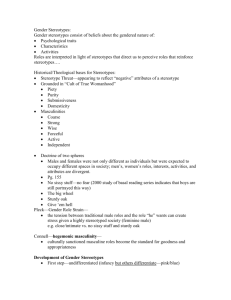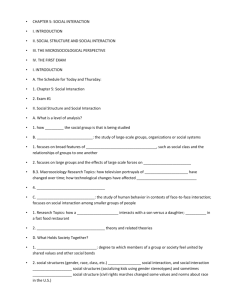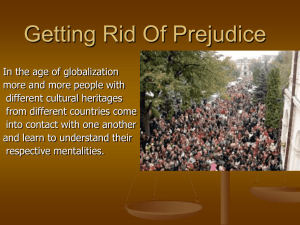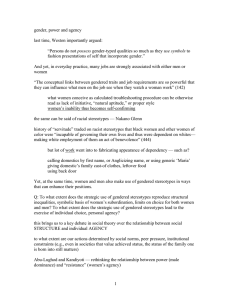The Silent Conflict of Gender Since the beginning of time and
advertisement
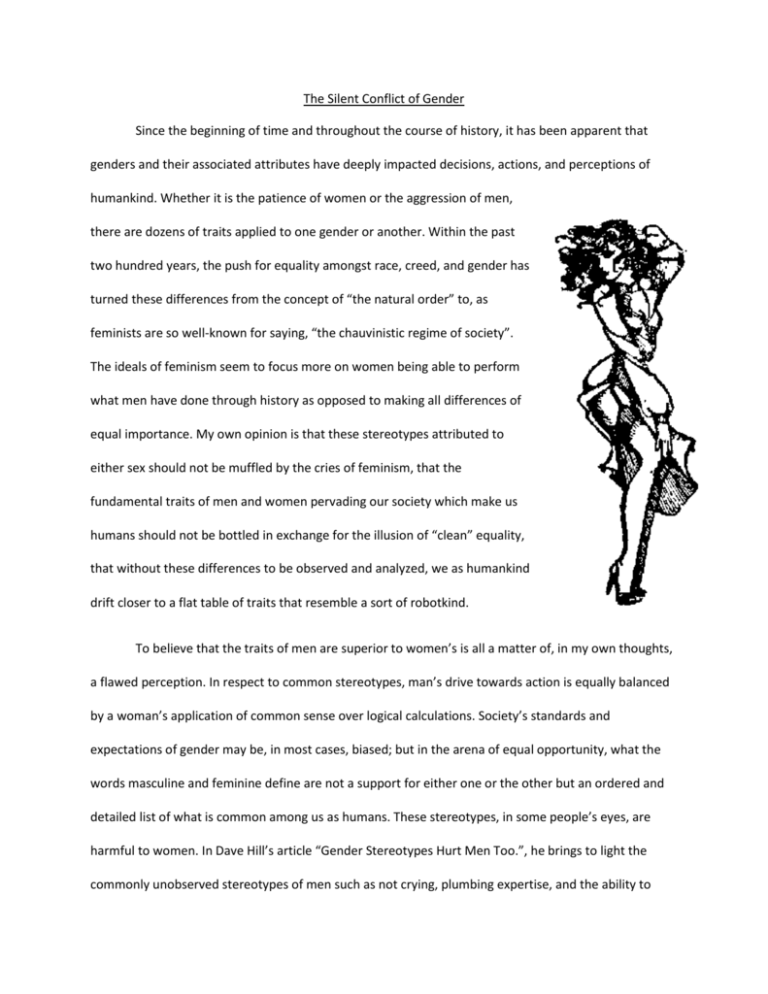
The Silent Conflict of Gender Since the beginning of time and throughout the course of history, it has been apparent that genders and their associated attributes have deeply impacted decisions, actions, and perceptions of humankind. Whether it is the patience of women or the aggression of men, there are dozens of traits applied to one gender or another. Within the past two hundred years, the push for equality amongst race, creed, and gender has turned these differences from the concept of “the natural order” to, as feminists are so well-known for saying, “the chauvinistic regime of society”. The ideals of feminism seem to focus more on women being able to perform what men have done through history as opposed to making all differences of equal importance. My own opinion is that these stereotypes attributed to either sex should not be muffled by the cries of feminism, that the fundamental traits of men and women pervading our society which make us humans should not be bottled in exchange for the illusion of “clean” equality, that without these differences to be observed and analyzed, we as humankind drift closer to a flat table of traits that resemble a sort of robotkind. To believe that the traits of men are superior to women’s is all a matter of, in my own thoughts, a flawed perception. In respect to common stereotypes, man’s drive towards action is equally balanced by a woman’s application of common sense over logical calculations. Society’s standards and expectations of gender may be, in most cases, biased; but in the arena of equal opportunity, what the words masculine and feminine define are not a support for either one or the other but an ordered and detailed list of what is common among us as humans. These stereotypes, in some people’s eyes, are harmful to women. In Dave Hill’s article “Gender Stereotypes Hurt Men Too.”, he brings to light the commonly unobserved stereotypes of men such as not crying, plumbing expertise, and the ability to wrestling grizzly bears. It is plain to see that most guys don’t file under all three of these things, but to make a motion to delete these traits because they pressure men would detract from a person’s overall experience and would lessen the options of what this person might want to do with their life (maybe they want to wrestle grizzlies). One reason for this opinion is supported by another presumed trait of human nature: competition. Competition is NOT a man’s sport, it’s a human sport. In John A. List’s summary of an experiment entitled “Gender Difference in Competition: Evidence from a Matrilineal and Patriarchal Society”, he describes the unique phenomenon of two African societies (one patriarchal the other matrilineal) where the patriarchal society had more men competing and the matrilineal society had more women supporting competition. If the competing were different between the societies was not discussed. The human race has always been driven to succeed over another human being; whether it be in a sport, a game, or a war. Men, according to stereotype, are more aggressive and have stronger drives involved, while women are naturally more controlled and are less prone to making mistakes. While different, both men and women desire to compete and come out on top. No one wants to fail. It seems that these gender stereotypes enrich the battlefield so to speak, that without them there’s less motivation to become better. Without competition or hurdles to jump, how can someone become better? Given the United States, not being a patriarchy as far as I’m aware, everyone is inclined to compete; in what way is not dictated BUT the separate ways are indeed classified under the common populace’s perception of stereotypes. Roy F. Baumeister in his article “Is there Anything Good About Men?” he brings up an interesting and intellectually stimulating fact that seems to equalize men and women but continue to support that gender plays a part of our programming. He states plainly “men are better AND worse than women”, he brings up different statistics that suggest that fate or nature or god rolls the dice with men more than women. Men seem to be at the top of their classes more than women but there is also, by his statistics, far more men who are on the bottom rung. His main statement is that men are more extreme overall which makes women better. He observes the odd transition over thirty years. Before 1960, the general opinion was that men were superior to women. In the 1970’s, the popular idea was that everyone was equal, just different, and after 1980 the opinion has shifted to women are better than men? Why? Baumeister believes that it’s because, although men succeed more it seems, they also fail more. In a livejournal titled “Sexual orientation, gender, and competition” written by the user wildeabandon, the writer goes to explain her logical determination that there’s no reason to choose men over women. Through her relationships and her attempt to “avoid these assumptions” of gender stereotypes she still found it surprising when men liked shopping and shoes and when other women didn’t. While she still experiments with relationships she has stopped assuming that there’s not a single spectrum to view and both genders through. There is no reason to think that a man is better because of his penis, nor is a woman worse for her lack of one. It’s a stupid, archaic opinion. Is a man better at mining, or boxing, or hockey or anything like that because his frame, as a male, is more inclined toward heavy labor and pushing? Yes. Is a woman better at discussions, plans, and talking things out because the chemical wash at birth causes her to hold common, rational sense over rigid logic? Yes. Can either of the genders become good, better, and best at any activities allocated to the other? Yes. Should we delete certain traits of men because they’re manly or traits of women because they’re girly? No way in hell, I say. I consider that the highest value of a person is their individuality. Each person has their own right to make themselves whoever they want to be and no one should say because they’re a girl or a guy they can’t do it. If a girl wants to cook and clean, let her. If a boy wants to cook and clean, let him. But still realize that our society (and we are still in that society) has determined that cooking and cleaning is what the woman usually does. It’s hard as ice. No matter what we do against that idea, we will never NOT know that women were considered (or are in some cases) the cook and the maid. If a boy wants to work on a car or watch the football game, let him. If a girl wants the same, let her. But as before, these traits were and are male-sanctioned activities in the majority. The idea of the feminist, in my head, is the search for a complete 50% wash; a world where half of one gender can do all the girly things and one half can do all the manly things. Sounds a little rigid and demeaning right? Who would want to live in a world where you were either on one half of your gender or the other? I say they want a 50% world because no matter how many leaps and bounds we make towards equal action, no matter how much progress we make. As long as one activity is dominated by one gender, the world isn’t equal to them. Do what you please. Notice that everyone does what they do because they like it (or because their parents, or friends, or superiors tell them to). No one is under the oppressive yolk of a woman or a man unless they’ve formally agreed to it and that’s a choice that the individual person has made. As George Carlin said it, “We all have unlimited rights or we have no rights at all.” And I believe it. I support everyone’s ability to do as they please whether they’re male or female and deal with the consequences be they positive or negative. The world’s a better place with options, and the gender stereotypes so many people fight against provide the most abundant supply of options. Bibliography List, John A.. "Gender Differences in Competition: Evidence from a Matrilineal and a Patriarchal society". National Bureau of Economic Research. <http://papers.nber.org/papers/w13727>. wildeabandon. "Sexual Orientation, gender, and competition". <http://wildeabandon.livejournal.com/145488.html>. Baumeister, Roy F.. "Is There Anything Good About Men?". <http://www.psy.fsu.edu/~baumeistertice/goodaboutmen.htm>. Hill, Dave. "Gender Stereotypes Hurt Men Too". <http://www.guardian.co.uk/commentisfree/2008/jul/08/gender.politics>.






